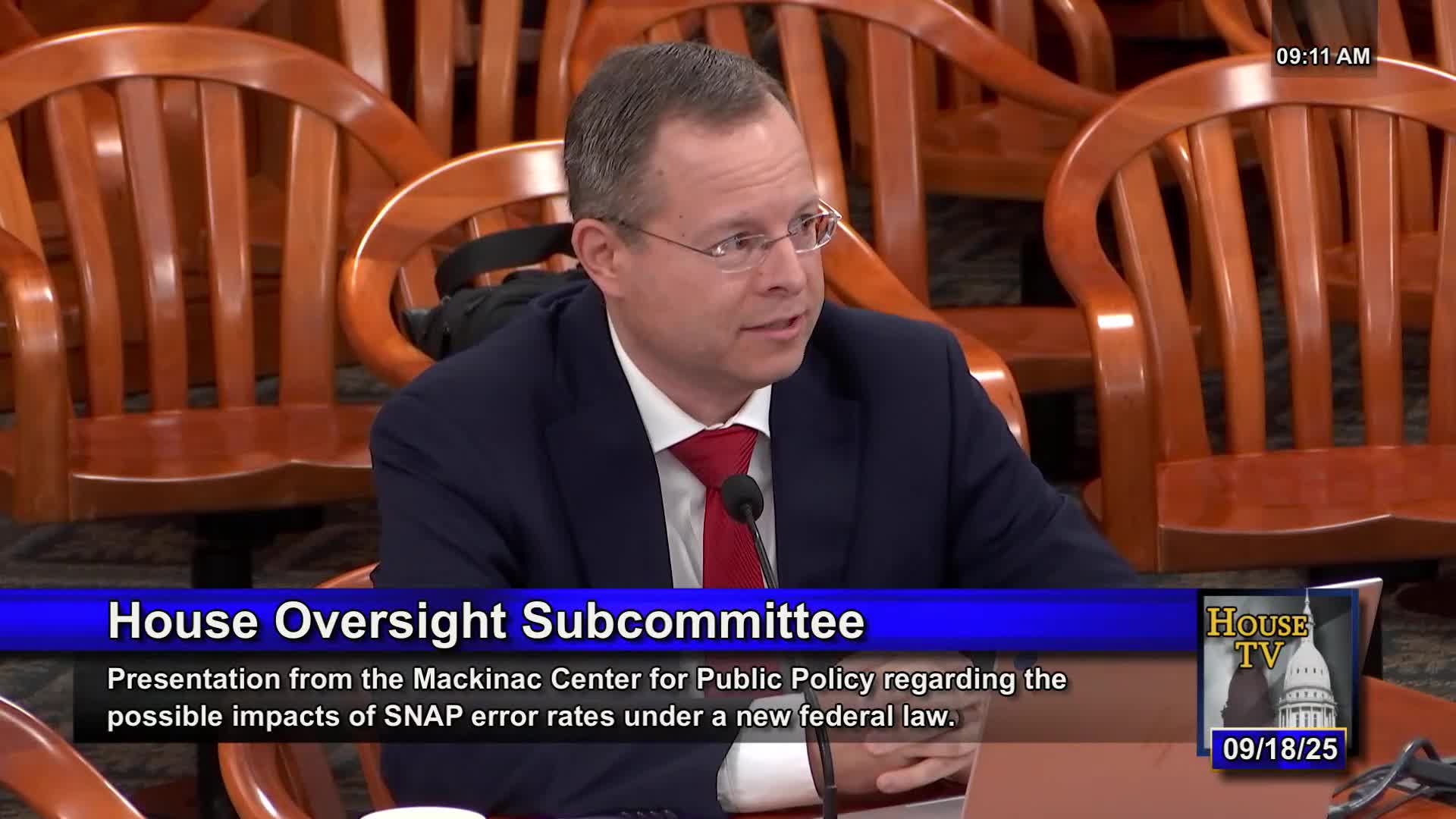Michigan Faces New SNAP Cost Sharing and Error Rate Penalties Under OBAA
September 19, 2025 | 2025 House Legislature MI, Michigan
This article was created by AI summarizing key points discussed. AI makes mistakes, so for full details and context, please refer to the video of the full meeting. Please report any errors so we can fix them. Report an error »

In a recent meeting of the Oversight Subcommittee on State and Local Public Assistance Programs, the discussion turned to the Supplemental Nutrition Assistance Program (SNAP), commonly known as food stamps. The atmosphere was charged with concern as committee members examined the program's current status and its implications for Michigan residents.
Currently, approximately 1.5 million Michiganders rely on SNAP, which translates to about one in every seven individuals in the state. This statistic places Michigan thirteenth in the nation for the percentage of its population receiving assistance. The program, which has roots dating back to the Kennedy administration and was formalized during Johnson's presidency, has seen fluctuating enrollment numbers over the decades. Notably, enrollment peaked in February 2011, with nearly 2 million individuals participating. Since then, numbers have fluctuated, particularly in response to economic conditions and the recent pandemic.
The committee highlighted that the rise in SNAP enrollment often correlates with economic downturns. Michigan has faced its share of economic challenges, including a single-state recession and the Great Recession, both of which contributed to increased reliance on food assistance. As the state continues to navigate the post-pandemic landscape, enrollment remains higher than pre-1990s levels, reflecting ongoing economic pressures.
A significant focus of the meeting was on the issue of improper payments within the SNAP program. The Government Accountability Office defines these as payments that should not have been made or were made in incorrect amounts. This includes both overpayments—where households received more assistance than they were eligible for—and underpayments, where individuals did not receive the full benefits they qualified for. The committee discussed the importance of addressing these error rates, as they impact the overall effectiveness and integrity of the program.
As the meeting concluded, the subcommittee members recognized the need for ongoing oversight and potential reforms to ensure that SNAP continues to serve those in need effectively. With the changing economic landscape and evolving federal eligibility standards, the future of public assistance programs like SNAP remains a critical topic for Michigan's lawmakers and its residents.
Currently, approximately 1.5 million Michiganders rely on SNAP, which translates to about one in every seven individuals in the state. This statistic places Michigan thirteenth in the nation for the percentage of its population receiving assistance. The program, which has roots dating back to the Kennedy administration and was formalized during Johnson's presidency, has seen fluctuating enrollment numbers over the decades. Notably, enrollment peaked in February 2011, with nearly 2 million individuals participating. Since then, numbers have fluctuated, particularly in response to economic conditions and the recent pandemic.
The committee highlighted that the rise in SNAP enrollment often correlates with economic downturns. Michigan has faced its share of economic challenges, including a single-state recession and the Great Recession, both of which contributed to increased reliance on food assistance. As the state continues to navigate the post-pandemic landscape, enrollment remains higher than pre-1990s levels, reflecting ongoing economic pressures.
A significant focus of the meeting was on the issue of improper payments within the SNAP program. The Government Accountability Office defines these as payments that should not have been made or were made in incorrect amounts. This includes both overpayments—where households received more assistance than they were eligible for—and underpayments, where individuals did not receive the full benefits they qualified for. The committee discussed the importance of addressing these error rates, as they impact the overall effectiveness and integrity of the program.
As the meeting concluded, the subcommittee members recognized the need for ongoing oversight and potential reforms to ensure that SNAP continues to serve those in need effectively. With the changing economic landscape and evolving federal eligibility standards, the future of public assistance programs like SNAP remains a critical topic for Michigan's lawmakers and its residents.
View full meeting
This article is based on a recent meeting—watch the full video and explore the complete transcript for deeper insights into the discussion.
View full meeting
